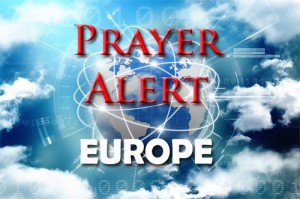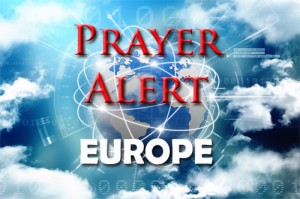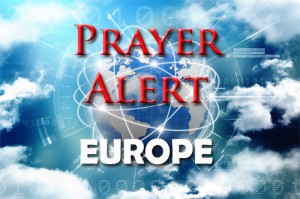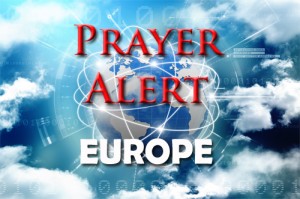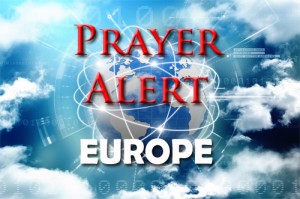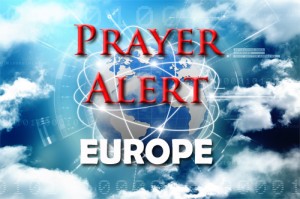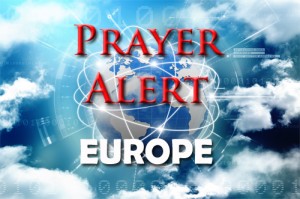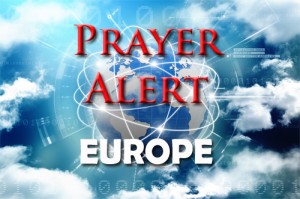Displaying items by tag: Europe
German Bible reading broadcasts
Six years after the first episode of ‘Reading the Bible with Ulrich Parzany’ went on air, the Christian TV station Bibel TV will broadcast a new devotional section, starting on Sunday 4 November. In it, Pastor Ulrich Parzany deals with Matthew's Gospel in 164 episodes. Viewers will get to know the clarity of the Bible and the relevance of the biblical word for us today. The programme’s content and language is carefully chosen to reflect the fact that it is watched both by Christians and non-Christians. Other books available on Bibel TV’s website are Luke, Acts, and Romans.
Wild weather across Europe
Violent storms battered Italy, killing at least 11 people. Venice’s St Mark’s Square was inundated and the adjacent basilica had its baptistry totally flooded and its mosaic floors covered by 35 inches (89 cm) of water. ‘The basilica has aged twenty years in just one day, and perhaps I am being overly optimistic about that,’ said the church’s chief administrator. ‘It is becoming ever more difficult for us, and indeed could become impossible for us to repair the damage, especially in an age of climate change.’ Meanwhile, heavy snow in parts of Spain left two mountain hikers missing, and a tornado ravaged Menorca,leaving 38,000 people without power. See
Europe: Human Prayer Chain - Germany
We are building a Human Prayer Chain for Germany and the European Continent
Hand in Hand praying for our country / our countries!
Come and join us in prayer on 09. November 2018 at 11am and 3pm. MEZ / CET at 100 locations along the German border!
The time is NOW!, there is a need to act! We have seen a dramatic change in Germany and in other European countries in the last few years. Prayer is urgent, because we all need God's encounter in our country and on this former Christian continent!
Our aim is to build teams of German believers and believers from other countries as well. Denominations do not matter, only living faith in our LORD and Saviour Jesus Christ.
Two times Christians were praying in unity for Germany and Europe along the German border, in October 2015 and during Pentecost 2016. We have been obedient according to the call of God and we have another opportunity this year. That's why we are planning to do it a third time to pray and proclaim intensely and in unity along the border to our European neighbours.
Friday 9 November 2018 is a very historic day for Germany. We will come together at 11am. and 3pm. MEZ / CET again to pray at exactly 100 locations (you will find them under "locations" on this page). We will go to the German border again - the common border with nine European nations - to plead to God the Father in the name of HIS Son Jesus Christ for HIS encounter for Germany and Europe.
Be one of the living stones, Jesus Christ can use to rebuild the spiritual wall around Germany and the other European countries. Pray with us for God's protection and a spiritual breakthrough. We need HIS encounter NOW! It is time for the body of Christ to arise and to take responsibility for our nations!
We call the believers of The Netherlands, Denmark, Great-Britain, Poland, Austria, Switzerland, France, Russia, Bulgaria, Spain, Italy, Finland, Sweden, …" Come and join us!"
Brothers and sisters from other continents, from the USA and Canada or South America and Australia as well as Asia for instance - you are also invited! We will be glad when you join us on those days. If you cannot join us in prayer here in Germany, then please consider supporting financially or / and come together in your church or prayer group just where you are and pray on the same day and the same time with us together. We will be one in the spirit!
We don't want to wait for a better time and there may not be a better time than this. The time is NOW! We are standing up and taking responsibility for Europe. These are OUR countries!
Many have been working before us. We now step into their foot steps. Let us pray for the Salvation and Future of our countries and our nations!
IT' S TIME FOR THE REIGN OF GOD.
Your Save Europe Team
Heidi Mund & Save Europe Team
E-Mail: This email address is being protected from spambots. You need JavaScript enabled to view it.
Webpage: www.SaveEurope.de
The Vision: https://youtu.be/jLVqVCprPR4
What you can do
to support the call for the salvation and rescue of Europe?
- Forward the video https://youtu.be/jLVqVCprPR4 , the webpage www.SaveEurope.de , the vision and flyers in eight languages to all of your friends. Ask them to do the same and to forward the information about the „Human Prayer Chain - Save Europe 2018“ to all of their friends, so that they will know too.
- Everyone, who is a believer in Jesus Christ and also those, who stand for Christian values in Germany and abroad as well are invited to come to the common boarder of Germany with 9 European nations and to pray together with us at 11 a.m. and 3 p.m. CET / MEZ for a spiritual breakthrough in Germany and Europe. We urgently need God’s encounter, we need a miracle to save our nations and to rescue the continent.
- If you cannot be with us on that day in Europe, please organize prayer, just where you are; on Friday 09 November at the same time together in your church or home group.
- Support others, so that they can come to stand with us as „The Human Prayer Chain“ (Bank Account you will find on the webpage www.SaveEurope.de under „Spenden“
- Pray, that our heavenly Father opens the hearts of the people, that we can come together in unity, because He gives His blessings to those who are united.
To find out the time change: https://www.timeanddate.de/uhrzeit/
The flyer in English, you will find flyers in 8 languages also under download on the webpage www.SaveEurope.de.
Brexit border stalemate
Karen Bradley, the Northern Ireland secretary, was challenged by British and Irish parliamentarians on the potential for violence if Brexit allowed any physical infrastructure to return to the Irish border. Senator Frank Feighan said that the people of Ireland would tear it down with their own hands, adding, ‘That’s what’s coming from the people on the ground, not from me’. In December 2017, both sides agreed to a ‘backstop’ position to avoid a hard border if a wider trade deal failed to be struck. Negotiators are now unable to translate this backstop decision into a legally binding commitment. Ms Bradley also expressed the opinion that if there were a second referendum, the vote to Leave would be even stronger.
Polish election result
Poland's electoral officials have reported that a pro-European Union opposition party has defeated the ruling conservatives in local elections in Warsaw. The 21 October national elections were a popularity test for the conservatives, whose policies have drawn street protests and prompted clashes with EU leaders. The regional elections decide the makeup of local governments and regional parliaments, including several mayoral races. These elections possibly foreshadow legislative and European elections in 2019.
Norway: NATO war games
NATO has launched its biggest military exercises since the end of the Cold War, amid rising tensions with Russia. About 50,000 soldiers from 31 countries are taking part in a mock battle in Norway, against an invading force named Trident Juncture 18. The battle is scheduled to run until 7 November. NATO secretary-general Jens Stoltenberg said the drills would send a clear message to ‘any potential adversary’. Washington is contributing the biggest contingent of troops to the exercises, which are taking place just weeks after Russia staged its own largest-ever military drills.
Crimea: eighteen students killed
Attacks by disaffected teenagers at schools and colleges have hit the headlines recently in Russia. In January, a student in Siberia attacked a teacher and fellow-students with an axe and set fire to the school. In April, in the Urals, another student stabbed a teacher and a student and set fire to a classroom. But this week’s tragedy of 18 school children killed and 53 injured has led to three days of mourning from 18 October. Speaking to journalists and parents of missing students in the city of Kerch, where the shooting took place, Crimean leader Sergei Aksyonov said the death toll stood at eighteen 14- to 16-year-olds, plus the killer Vladislav Roslyakov. Witnesses said they heard shots and ran into the corridor, where they were randomly targeted with a machine gun. Victims were taken away in buses and minibuses: ‘Children and staff, without legs, without arms’.
The poorest country in Europe
Albania is considered to be the poorest country in Europe, with a high level of poverty and little access to basic social services. Thousands of children face injustice in many forms of abuse, violence, exploitation and early marriage. The country still lacks a fully functional system which should prevent, protect, and rehabilitate children from all forms of discrimination and abuse. World Vision works there to speak up on behalf of children and improve lives through child protection programmes (see ) In spite of the introduction of child protection measures, Albania is still one of the riskiest places for children in Europe. The risks start at birth - a high infant mortality rate - and continue through to early adulthood, when the lack of opportunities makes it difficult for them to become independent. UNICEF reported that 12% of children aged 5-14 are working while adults face unemployment and poverty.
Russia: Putin’s popularity decreasing
A survey by the independent pollster Levada Centre shows the number of Russians regarding Putin as Russia’s most trusted politician has fallen significantly recently. The survey asked respondents to list five or six politicians whom they trusted the most. Although Putin was first with 39%, trust in him had fallen 9% since June and a total of 20 percentage points since November. He recently signed into law an unpopular bill that gradually increases the state retirement age to 60 for women and 65 for men. Most ordinary Russians are deeply opposed to the reforms, which sparked rare street protests across the country. Putin’s lowest-ever rating in a Levada poll came in 2013, when only 30% said he was a trusted politician. Then his popularity surged to over 80% after Russia annexed Crimea from Ukraine.
Europe: kicking the plastic habit
The EU is taking a hard line on single-use plastics, with the European parliament's environment committee voting to bolster the Commission’s plastics policy. The report now lays out bans on plastic straws, plastic cutlery, and expanded polystyrene food packaging, as well as committing countries to cutting down on other plastics. It now faces a final vote later in October.

